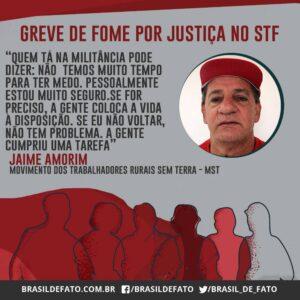A Hunger Strike for Judicial Justice
Since July 31st, seven activists from people’s movements including the MST have taken extreme measures. They are staging an indefinite hunger strike to demand the release of former Brazilian President Luiz Inacio Lula da Silva from imprisonment so he may run in the upcoming national elections.
Lula has been in prison since April 7th, and though he has been accused of corruption and money laundering, he has not been proven guilty. The Brazilian constitution states that no Brazilian can be imprisoned while their case can still be appealed; that the accused are presumed innocent until proven guilty.
In response, activists are demanding justice from the country’s judicial system. They firmly believe that Lula has the right to be a presidential candidate, and that keeping him off the ballot is an open attack against the Brazilian people’s electoral rights.
Friar Sérgio from the Small Farmers Movement (MPA) and participant in the hunger strike, expresses how Lula represents hope in Brazil: “We can starve as a conscious gesture for our struggle, but if we keep this model of country, hunger will be forced upon many Brazilians. For the people, the symbol of hope to change this situation is Lula.” In a current poll, 37% of Brazilians say they would still vote for Lula despite his conviction. He remains the most popular candidate by far. If he is kept from running for office, the hunger strikers believe that the election would not reflect the will of the Brazilian people.
This courageous action by movement leaders of the Levante Popular da Juventude, Movement of Small Producers (MPA), the Landless Workers Movement (MST), and others, carries a deeper significance as well. Millions of Brazilians are once again suffering from hunger because of policies and cuts to social programs made by Michel Temer’s administration. The hunger strike is not only a protest for Lula’s release, but helps to expose the ongoing poverty, hunger and unemployment.

Lula helped millions of Brazilians escape from poverty during his presidency from 2003 to 2010 and expanded access to higher education for working-class people, Black people, and Indigenous people. Many of these progressive changes have been rolled back by the current administration.
Jaime Amorim, a leader of the Landless Workers Movement in Pernambuco (MST-PE), a Grassroots partner organization, explains how the strike will only end when Lula is released and allowed to run for president: “We do not have much time to be afraid. Personally, I’m very confident. If it is necessary, we will give up our lives. If I do not come back, it’s okay. We accomplished a task.” Jaime and the other activists are demonstrating a tremendous amount of inner strength to fight for judicial justice and Lula’s freedom.
About the Author: Leonie Rauls began interning at Grassroots International after graduating from Amherst College in May 2018. She has a degree in Political Science and Spanish, and wrote her senior honors thesis on Conditional Cash Transfers, a poverty alleviation program in Latin America. She hopes to continue conducting social policy research to help create a more just and equitable society.

